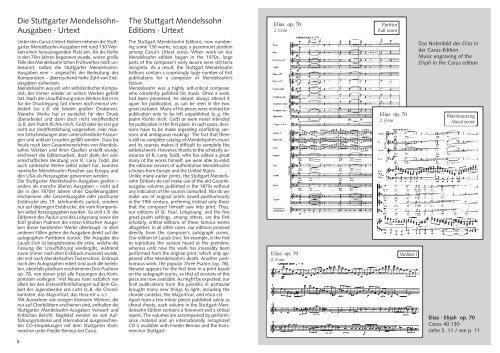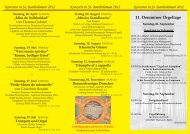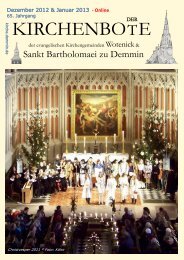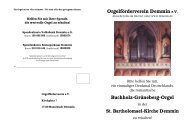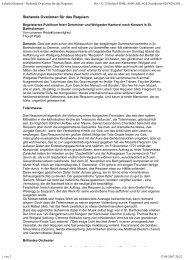felix mendelssohn bartholdy
felix mendelssohn bartholdy
felix mendelssohn bartholdy
Sie wollen auch ein ePaper? Erhöhen Sie die Reichweite Ihrer Titel.
YUMPU macht aus Druck-PDFs automatisch weboptimierte ePaper, die Google liebt.
Die Stuttgarter Mendelssohn-<br />
Ausgaben · Urtext<br />
Unter den Carus-Urtext-Reihen nehmen die Stuttgarter<br />
Mendelssohn-Ausgaben mit rund 130 Werken<br />
einen herausragenden Platz ein. Als die Reihe<br />
in den 70er Jahren begonnen wurde, waren große<br />
Teile des Mendelssohn’schen Frühwerkes noch unbekannt,<br />
sodass die Stuttgarter Mendelssohn-<br />
Ausgaben eine – angesichts der Bedeutung des<br />
Komponisten – überraschend hohe Zahl von Erstausgaben<br />
aufweisen.<br />
Mendelssohn war ein sehr selbstkritischer Komponist,<br />
der immer wieder an seinen Werken gefeilt<br />
hat. Nach der Uraufführung eines Werkes hat er es<br />
für die Drucklegung fast immer noch einmal verändert<br />
(so z.B. die beiden großen Oratorien).<br />
Manche Werke hat er zunächst für den Druck<br />
überarbeitet und dann doch nicht veröffentlicht<br />
(z.B. den Psalm Richte mich, Gott) oder sie erst gar<br />
nicht zur Veröffentlichung vorgesehen. Hier müssen<br />
Entscheidungen über unterschiedliche Fassungen<br />
und unklare Lesarten gefällt werden. Dass bis<br />
heute noch kein Gesamtverzeichnis von Mendelssohns<br />
Werken und ihren Quellen erstellt wurde,<br />
erschwert die Editionsarbeit, doch dank der wissenschaftlichen<br />
Beratung von R. Larry Todd, der<br />
auch zahlreiche Werke selbst ediert hat, konnten<br />
namhafte Mendelssohn-Forscher aus Europa und<br />
den USA als Herausgeber gewonnen werden.<br />
Die Stuttgarter Mendelssohn-Ausgaben greifen –<br />
anders als manche älteren Ausgaben – nicht auf<br />
die in den 1870er Jahren ohne Quellenangaben<br />
erschienene alte Gesamtausgabe oder posthume<br />
Erstdrucke des 19. Jahrhunderts zurück, sondern<br />
nur auf diejenigen Erstdrucke, die vom Komponisten<br />
selbst herausgegeben wurden. So sind z.B. die<br />
Editionen des Paulus und des Lobgesang sowie der<br />
fünf großen Psalmen die ersten kritischen Ausgaben<br />
dieser berühmten Werke überhaupt. In allen<br />
anderen Fällen gehen die Ausgaben direkt auf die<br />
autographen Partituren zurück. Die Ausgabe des<br />
Lauda Sion ist beispielsweise die erste, welche die<br />
Fassung der Uraufführung wiedergibt, während<br />
zuvor immer nach dem Erstdruck musiziert wurde,<br />
der erst nach Mendelssohns Tod erschien. Erstmals<br />
nach den Autographen ediert sind auch die beliebten,<br />
ebenfalls posthum erschienenen Drei Psalmen<br />
op. 78, von denen jetzt alle Fassungen des Komponisten<br />
vorliegen. Viel Neues kam natürlich vor<br />
allem bei den Erstveröffentlichungen auf dem Gebiet<br />
der Jugendwerke ans Licht (z. B. die Choralkantaten,<br />
das Magnificat, das Hora est u.a.).<br />
Mit Ausnahme von einigen kleineren Werken, die<br />
nur auf Chorblättern erschienen sind, enthalten die<br />
Stuttgarter Mendelssohn-Ausgaben Vorwort und<br />
Kritischen Bericht. Begleitet werden sie von Aufführungsmaterial<br />
und international ausgezeichneten<br />
CD-Einspielungen mit dem Stuttgarter Kammerchor<br />
unter Frieder Bernius bei Carus.<br />
8<br />
The Stuttgart Mendelssohn<br />
Editions · Urtext<br />
The Stuttgart Mendelssohn Editions, now numbering<br />
some 130 works, occupy a paramount position<br />
among Carus’s Urtext series. When work on our<br />
Mendelssohn edition began in the 1970s, large<br />
parts of the composer’s early œuvre were still terra<br />
incognita. As a result, the Stuttgart Mendelssohn<br />
Editions contain a surprisingly large number of first<br />
publications for a composer of Mendelssohn’s<br />
stature.<br />
Mendelssohn was a highly self-critical composer<br />
who constantly polished his music. Once a work<br />
had been premièred, he almost always altered it<br />
again for publication, as can be seen in the two<br />
great oratorios. Many of his pieces were revised for<br />
publication only to be left unpublished (e.g. the<br />
psalm Richte mich, Gott) or were never intended<br />
for publication in the first place. In such cases, decisions<br />
have to be made regarding conflicting versions<br />
and ambiguous readings. The fact that there<br />
is still no complete catalog of Mendelssohn’s music<br />
and its sources makes it difficult to complete the<br />
editorial work. However, thanks to the scholarly assistance<br />
of R. Larry Todd, who has edited a great<br />
many of the works himself, we were able to enlist<br />
the editorial services of authoritative Mendelssohn<br />
scholars from Europe and the United States.<br />
Unlike many earlier prints, the Stuttgart Mendelssohn<br />
Editions do not make use of the old Gesamtausgabe<br />
volumes published in the 1870s without<br />
any indication of the sources consulted. Nor do we<br />
make use of original prints issued posthumously<br />
in the 19th century, preferring instead only those<br />
that the composer himself saw into print. Thus,<br />
our editions of St. Paul, Lobgesang, and the five<br />
great psalm settings, among others, are the first<br />
scholarly, critical editions of these famous works<br />
altogether. In all other cases, our editions proceed<br />
directly from the composer’s autograph scores.<br />
Our edition of Lauda Sion, for example, is the first<br />
to reproduce the version heard at the première,<br />
whereas until now the work has invariably been<br />
performed from the original print, which only appeared<br />
after Mendelssohn’s death. Another posthumous<br />
work, the popular Three Psalms (op. 78),<br />
likewise appears for the first time in a print based<br />
on the autograph scores, so that all versions of this<br />
piece are now available. As might be expected, our<br />
firstl publications from the juvenilia in particular<br />
brought many new things to light, including the<br />
chorale cantatas, the Magnificat, and Hora est.<br />
Apart from a few minor pieces published solely as<br />
choral sheets, each volume in the Stuttgart Mendelssohn<br />
Edition contains a foreword and a critical<br />
report. The volumes are accompanied by performance<br />
material and an internationally recognized<br />
CD is available with Frieder Bernius and the Kammerchor<br />
Stuttgart.<br />
Elias op. 70<br />
2. Coro<br />
Elias op. 70<br />
2. Coro<br />
Partitur<br />
Full score<br />
Elias op. 70<br />
2. Coro<br />
Violino I<br />
Das Notenbild des Elias in<br />
der Carus-Edition<br />
Music engraving of the<br />
Elijah in the Carus edition<br />
Klavierauszug<br />
Vocal score<br />
Elias · Elijah op. 70<br />
Carus 40.130<br />
siehe S. 11 / see p. 11


